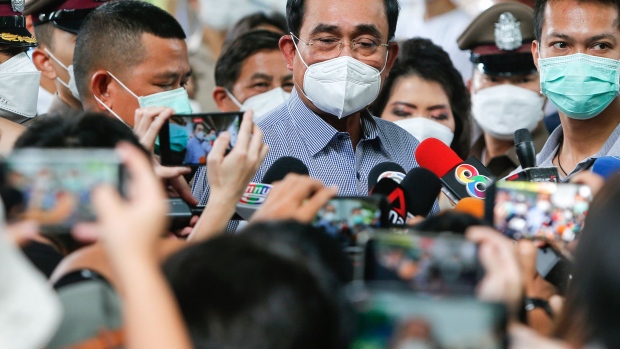Sep 29, 2022
Thai Court Ruling to Decide Prayuth’s Fate as Election Nears
, Bloomberg News

(Bloomberg) -- Thailand’s Prime Minister Prayuth Chan-Ocha will remain in office after the highest court ruled he hadn’t breached a constitutional term limit, handing him a victory as political jockeying increases ahead of elections that must be called by March.
The nine-member Constitutional Court said Friday the eight-year term limit can’t be imposed retroactively on Prayuth, who first took office on Aug. 24, 2014 after leading a coup. That’s because this provision and the military-backed charter only became effective in 2017.
Prayuth’s prime ministerial term is deemed to have started from April 6, 2017, the court said in majority ruling, with three members dissenting. That would allow Prayuth to remain the leader until 2025 if he’s picked to lead the ruling coalition again and it returns to power.
The court’s decisions are always final and cannot be appealed.
While the baht extended gains to as much as 1% to trim the biggest quarterly loss in more than two years, the main stock index ended 0.2% lower after the court ruling.
The verdict marked the end of the what appeared to be the hardest challenge yet for Prayuth, who had faced and survived a series of no confidence votes. He was suspended from office last month by the court as it deliberated on the opposition’s petition that argued he had completed eight years in office since the May 2014 coup.
Waning Popularity
The court’s scrutiny had fueled speculation that Thailand’s royal establishment was looking to replace Prayuth ahead of the next election. His popularity has slumped for at least four straight quarters as his government struggles to shore up an economy still reeling from the Covid-19 pandemic.
Although election rules still favor the military-backed group to retain power, it faces stiff competition against the Pheu Thai party backed by former leader Thaksin Shinawatra, whose allies have won the most seats in every national vote over the past 21 years. Prayuth ousted Thaksin’s sister, Yingluck Shinawatra, in 2014.
“If the establishment forms the next government and their seats in parliament are not significantly more than the opposition, it is likely someone will replace Prayuth as the preferred candidate,” said Titipol Phakdeewanich, dean of political science at Ubon Ratchathani University. “The next government will likely want someone who can stay a full four-year term.”
Prayuth said he respected the ruling and thanked his supporters for the well wishes and moral support during his suspension.
Prayuth’s Reaction
“The past month has given me an opportunity to reflect and realize that I have to spend the government’s precious time, which is limited, to push many important projects that I started,” he said in a post on Facebook.
Prayuth will go to the Government House to resume his prime ministerial duties from Monday, his legal adviser Veera Rojanavas told reporters.
Anti-government activist groups gathered in central Bangkok before the court ruling, with some threatening to step up protests if the court let Prayuth stay in power. The groups had sought to oust him in monthslong street protests in 2020 that also made unprecedented calls to curb the monarchy’s powers.
The largest opposition party slammed the court ruling, saying the “verdict may have legitimacy issues and will set a precedent for legal interpretation.” It also raises questions if the interpretation is “is in line with the constitution’s intentions,” Pheu Thai Secretary-General Prasert Jantararuangtong, told a briefing.
The reprieve for Prayuth also averts an immediate political vacuum in Thailand, which is set to host world leaders at the Asia-Pacific Economic Cooperation leaders summit in November.
The end to political uncertainty will boost confidence of the local and foreign businesses and the government should turn its focus on tackling rising living cost, Sanan Angubolkul, chairman of the Thai Chamber of Commerce, said in a statement.
(Updates with comments from opposition party in 14th paragraph.)
©2022 Bloomberg L.P.







